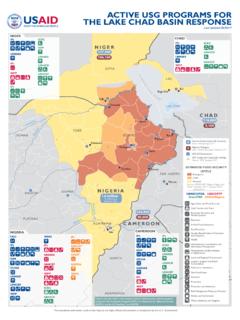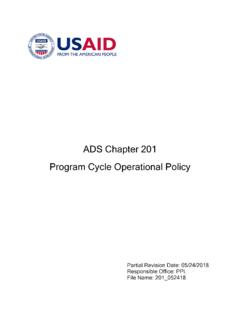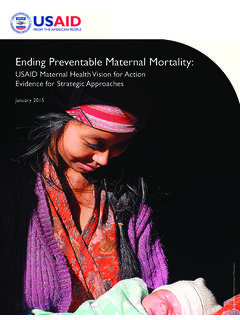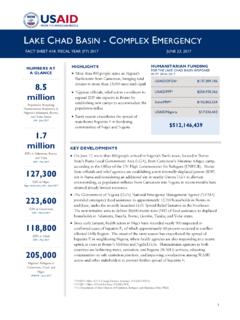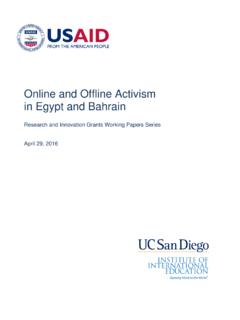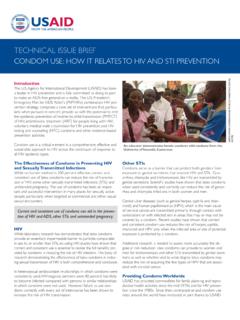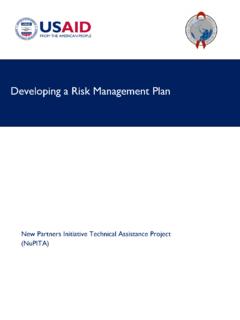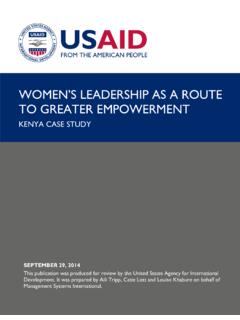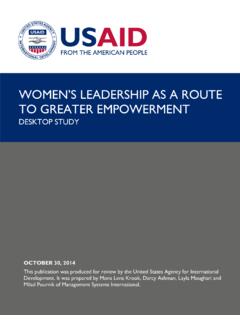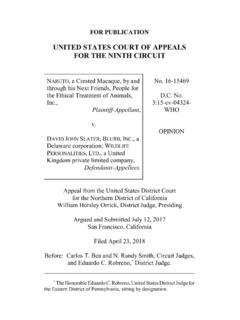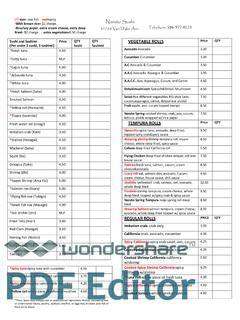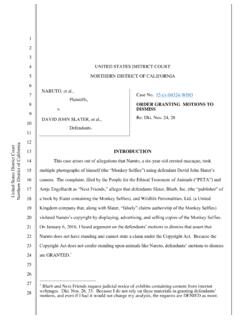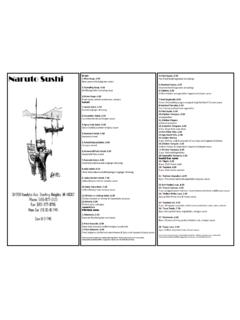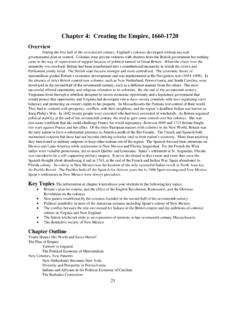Transcription of Team Building Module Facilitator’s Guide
1 1 team Building Module facilitator s Guide New Partners Initiative Technical Assistance Project (NuPITA) September 2012 2 The New Partners Initiative Technical Assistance (NuPITA) project is funded by the United States Agency for International Development (USAID) and implemented by John Snow, Inc. and Initiatives Inc., contract GHS-I-00-07-00002-00. This document is made possible by the generous support of the American people through USAID. The contents are the responsibility of John Snow, Inc. and do not necessarily reflect the views of USAID or the United States Government.
2 September 2012 John Snow, Inc. NuPITA John Snow, Inc. 44 Farnsworth Street Boston, MA 02210-1211 Phone: 3 I. Module Overview A. Purpose Effective organizational or team performance is based on a clear understanding of the shared goals, strategies, and work plans, along with the individual roles and responsibilities of team members. Equally important are interpersonal qualities of trust, communication, and mutual accountability. Working in tandem, these two perspectives determine a team s ability to achieve and sustain high performance, making teambuilding a necessary companion to the operational and programmatic efforts of organizational capacity strengthening.
3 Yet team development is something that is often ignored within organizations or projects. Staff usually have little conscious awareness of the skills and tools needed to nurture supportive collegial relationships. Leaders and managers are rarely prepared to understand the dynamics of team formation and staff motivation or respond appropriately to the emerging needs of a team . Too frequently, conflict is either ignored or suppressed, attributed to individual differences and difficulties. As a result, internal team process can become a liability to performance, leading to low productivity, low morale, and high staff turnover.
4 However, with increased awareness of basic skills and tools for addressing common challenges, these same dynamics can be turned into a source of continued team enhancement. This teambuilding workshop will help grantees develop shared vision/understanding for a high-performing team , determining the critical elements and individual contributions that comprise this vision, and guiding plans or agreements to realize this vision in their own organizations. It will also promote practice on key skills needed to address the inevitable challenges that arise in teams, notably, appreciating individual differences, communicating collaboratively, and managing conflict.
5 B. Learning Objectives By the completion of this Module , participants will be able to describe: Characteristics of effective teams Four stages of team development Individual differences and roles within the team Have practiced skills in: Supporting team development through its formative stages Constructive communication Conflict resolution And will have discussed: A vision of their ideal team Principles and behaviors to Guide team performance A plan for monitoring progress toward achieving their vision C. Audience This interactive short-course on teambuilding is designed to involve all members of a team , be it a department, project, or an entire organization.
6 To be effective, attendance of all staff and full participation of senior team leaders ( , the organizational director, project manager, or similar) are important. Ideally, the Module facilitator should be someone external to the team , such as an NPI technical assistance provider, but may be from another department, such as HR. D. Schedule The following schedule outlines the estimated time for each session and provides a suggested schedule for the workshop. However, it is important to note that the schedule need not replicate 4 the model but should be adapted through discussion with the organization to meet its particular time constraints and topical interests.
7 For example, the organization may prefer to cover the material over two consecutive days. In this case, the following agenda is suggested as the implementation schedule. The organization may also choose to spread sessions over the course of several weeks. Or it may choose to engage select sessions independently to address a specific issue. In the latter cases, use the time estimates to schedule the session as most appropriate. Day 1 Time Session Topic Format 1:00 1:30 1 Workshop Introduction Group review and discussion 1:30 2:45 2 Characteristics of Effective Teams Group review and discussion 2:30 2:45 TEA BREAK 2:45 5:45 3 Building and Maintaining Teams Group work Day 2 Time Session Topic Format 9:00 9:15 Daily Start-Up Plenary discussion 9:15 10:15 4 Collaborative Communication Group practice 10:15 10:30 TEA BREAK 10:30 12:00 5 Managing Conflict Group practice 12:00 1:00 LUNCH BREAK 1:00 3:00 6 Monitoring team Development Group work 3:00 3:30 7 Workshop Closure Group work E.
8 Materials Pre-workshop review (to be conducted by the OD advisor) Assembly of participant folders and handouts Preparation of workshop slides or presentation flipcharts, if a slide projector will not be used F. Workshop Overview This interactive short-course on teambuilding may be used in full to provide a comprehensive review of teambuilding and conflict resolution. Each session is designed to be highly interactive and participatory, using a combination of techniques, including case studies, role-plays, small group exercises, large group discussions, and individual reflection. Participants will be able to use the practical exercises, tools, and resources both during and after the workshop to improve their internal teamwork.
9 This Module is organized along a progression of sessions that increasingly focus on the team directly and its plans for strengthening its effectiveness. Each activity contains a balance of theoretical material with opportunities for reflecting on its application within the team . Initial sessions focus broadly on the definition of a team and characteristics of effective teams. The design then turns to stages of team formation and actions appropriate to each. It also introduces a model for understanding individual perspectives of team members. Skill- Building sessions then focus on 5 strengthening interpersonal relations within teams through collaborative communication and conflict management.
10 Finally, the group is able to bring all these threads together by assessing its own team development, developing principles and behaviors for supporting high performance, and designing a plan for strengthening its interactions to achieve its team mandate. The focus of the workshop may be adapted to a variety of team applications. It may engage the entire organization as a whole or focus on only one department or project team . Whatever the application, the language and examples should be adapted to reflect those parameters. Trainer s notes are provided for each of the sessions to help trainers Guide the discussion and exercises.
